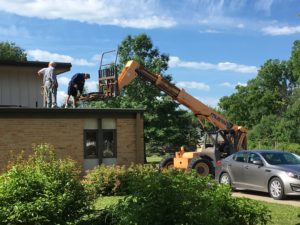 Corinne L. Nelson, age 93, of Decorah, IA, died Friday evening, June 30, 2017 at Winneshiek Medical Center in Decorah, with her husband Harland by her side.
Corinne L. Nelson, age 93, of Decorah, IA, died Friday evening, June 30, 2017 at Winneshiek Medical Center in Decorah, with her husband Harland by her side.
Memorial Services will be at 11:00 a.m. Tuesday, July 25, 2017 at Good Shepherd Lutheran Church in Decorah, with Pastor Amy Larson officiating. Private Family Inurnment will be in Lutheran Cemetery in Decorah.
Visitation begins at 10:00 a.m. Tuesday, July 25, one hour before the service, at Good Shepherd Lutheran Church.
Corinne Lois was born to Martin K. and Marie (Sletten) Rye in Yankton County, South Dakota, on July 15, 1923. A graduate of Augustana Academy at Canton, South Dakota, she received the B.A. Degree from the University of Minnesota in 1947.
Corinne was married to Harland Nelson at University Lutheran Church of Hope in Minneapolis on December 3, 1954. Harland was from a farm family (like Corinne) in rural Barnesville, in Clay County, MN. They moved to Storrs, CT in 1959, where Harland taught at the University of Connecticut until coming to Luther College in 1962. His Fulbright professorships took them to Bergen, Norway and Innsbruck, Austria and sabbatical leaves to St. Paul, MN and Leicester, England.
Her early places of employment were as an editorial assistant at the Evangelical Lutheran Church headquarters and as an administrative assistant and grant proposal preparer in the Mechanical Division of General Mills, Inc., both in Minneapolis. Later, she did copy editing and indexing of book manuscripts for publishers in New York and Minneapolis. From 1970 until her retirement in 1991, she held several positions at Luther College, the last as an advancement officer writing grant proposals.
For the city of Decorah, Corinne served on the Board of Adjustment, the Planning and Zoning Commission, and the Long-Range Planning Committee. At Decorah Lutheran Church, she served on the council and as president of the congregation, as a Sunday school teacher, on the refugee resettlement committee, on the 125th anniversary planning committee, and in WELCA and the Dorcas Circle. She was active in the American Association of University Women, Luther College Womans Club, Aase Haugen Homes Auxiliary, and as a volunteer with Vesterheim Norwegian-American Museum.
Corinne is survived by her husband Harland; three children and their families: Hilary Mark Nelson of West Lafayette, IN; Sarah Nelson and Tim Gresback of Moscow, ID; and Catherine Mizell-Nelson of New Orleans, LA; five grandchildren: Haley and Linnea Nelson, Luke Gresback, and Keely and Arlo Mizell. She is also survived by her sister, Ella Magstadt of Minneapolis, MN.
She was preceded in death by her parents; her brothers Kenneth and Glenn; and son-in-law Michael Mizell-Nelson.
Memorial gifts may be given to the Harland and Corinne Nelson Scholarship Fund at Luther College, c/o Development Office, 700 College Drive, Decorah, IA 52101 or the charity of your choice.




